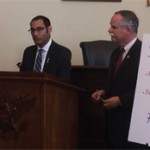Following Rep. McKinley was Congressman Joe Heck, DO, a Republican from Nevada. I introduced Rep. Heck, and sat down to listen to a detailed, nuanced discussion of healthcare policy, focused on the Medicare physician payment system, where it’s gone wrong, and how to fix it. Part of Rep. Heck’s focus is replacing the Sustainable Growth Rate (SGR). I know, how many times and for how many years have we talked about getting rid of the SGR? So often that now I find that, frequently, the first thing Congress members or staffers will say in meetings is, “I know about the SGR problem, we’re working on it.” That’s encouraging, but it is not enough. It is not enough to just talk about it, and it is not enough to replace the SGR unless it is replaced with the right “fix.” It is refreshing that at least members or staffers are candid and acknowledge right away that it is a tough year for agreements—especially the kind needed to find $300 billion to repeal the SGR. We have been told to expect another SGR patch, for now, but we are appeased that repeal may truly be possible next year.
New Legislative Efforts Support Rheumatology
Rep. Heck has introduced pertinent and groundbreaking legislation: the Medicare Physician Payment Innovation Act (H.R. 5707), cosponsored by Rep. Allyson Schwartz, a Democrat from Pennsylvania. Not only does it repeal the SGR, but we believe it also has an excellent chance of replacing it with something that would help advance rheumatology! Part of what the bill does is stabilize payment rates for a period, during which multiple payment and delivery models can be tested. One size will not fit all practices and geographic areas in this country, and this multimodel approach is something the ACR has been advocating. But, the most important part for us is that his bill also implements temporary pay increases for those who mostly provide primary-care services—defined as physicians billing at least 60% E/M—and it does this regardless of specialty. In other words, it recognizes the critical role of specialists like us who spend time with patients. Rheumatologists would be eligible for increases and are recognized for our role in care and coordination. Dr. Heck has provided a blueprint for doing payment reform in a way that advances rheumatology.
In fact, H.R. 5707 represents the first time rheumatologists and other cognitive specialists have been included in efforts to incentivize and reward primary-care services. We are recognized for delivering the critical face-to-face, hands-on care we provide every day for patients with arthritis and rheumatic diseases. This truly is progress!
